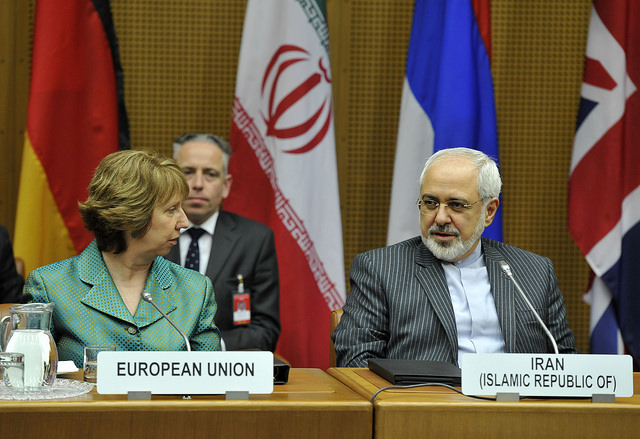by Peter Jenkins
What went wrong? Why were the United States and Iran unable to come to a comprehensive agreement in Vienna on Monday?
According to an Iranian source close to the negotiations, the main obstacle was the inability of the US negotiators to convince Iranian counterparts that the administration could persuade Congress to repeal relevant sanctions provisions.
Of course, the American negotiators offered executive waivers to exempt banks and exporters from US penalties for violating US sanctions legislation. But for the Iranian negotiators, a promise of waivers was not enough.
The Iranians reasoned—not unreasonably—that the promise of waivers could be ignored by President Barack Obama’s successor. They were well aware that European banks, some of which have been hit in recent years by gargantuan US fines, are unlikely to risk further such blows post-Obama by resuming normal business with Iran. On the contrary, non-US financial and trading companies are likely to be inhibited by the knowledge that this Damoclean sword, fashioned in the smithies of Capitol Hill, hangs over them.
This is but one explanation of why an agreement proved elusive on Monday. No doubt there are others. But this one rings true. It is certainly the case that European banks have become very wary of US sanctions provisions, and that they will not respond to the repeal of EU bilateral sanctions as Iran would wish while the threat of US penalties remains.
It is tempting to lament the lack of foresight of the first Obama administration. Their misguided belief that Iran could be coerced through sanctions into dismantling its uranium enrichment program led them to acquiesce to Congressional legislation that now stands between President Obama and the only achievement likely to stifle a hollow laugh, when future generations recall that he was awarded the Nobel Peace Prize in 2009.
But lamenting gets one nowhere. What’s needed is a solution to this problem—since, absent a solution, it looks unlikely that any number of extensions to the negotiation with Iran will lead to a comprehensive agreement.
I feel disabled by citizenship and ignorance from contributing anything more than a question. Could a concerted and determined European lobbying campaign help to sway enough senators into repealing or amending the problematic provisions?
The news that reaches my side of the Atlantic suggests the answer is “no.”
Congress has been in a highly partisan mood and is likely to remain so when it reassembles in January; so Senate Republicans are unlikely to be ready to facilitate a foreign policy success—even one that is in the US national interest.
If these days any country has a “special relationship” with the US, it is not the United Kingdom or other European nations; it is Israel. And we can all predict, based on his own public statements over the years, that Israel’s prime minister will fight tooth and claw to prevent the repeal of the legislation in question. Pitted against Israeli anxieties, and Congressional campaign funding considerations, Britain’s strategic loyalty to its US ally on many occasions, as well as cultural affinities, will count for very little.
Nonetheless, I hope it occurs to the US administration to encourage its European partners to bring to bear on the Senate whatever influence they have. It will be a disaster for US and EU interests in the Middle East if a vital nuclear non-proliferation policy founders on US sanctions legislation.
Is there no other aspect of the negotiation on which it could founder? My source suggests the Iranian side believes that the only other area in which significant problems remain is uranium enrichment. My source is confident, however, that these differences can be resolved if a solution can be found to the sanctions problem.
My own sense is that this optimism is not misplaced. I will explain why when I next write.






why not use NSA FBI and other tools on Congress? Are they only for ordinary people? I am sure there are many things that respectful Senators don’t like to exposed to public .
Much of the leverage right now: the falling price of oil. It hurts Iran and Russia; Saudi Arabia (=40% of OPEC production) is on-board and the U.S. with domestic production at 84% of total consumption is in a strong position vis a vis “needing” foreign oil less and less, as well as the increasing efficiency of newer cars boosting the disposable income of those who have to drive to/for their jobs. The lower the bbl price, the louder the Iranians will yell. That might also be the kick in their butt to do what it looks like only they can do: become a nexus of control in the area, which also makes them a buffer from Russia.
.
Ergo, it would appear that American economic and political pressure may be the best/ effective weapon in that area –and others?– and let the major players duke it out AS LONG AS THE OIL KEEPS FLOWING. After all, it always and always will be ABOUT THE OIL. Perhaps then our Armed Services personnel can go back to defending us instead of being underpaid mercenaries. American mlitary will ALWAYS be unwelcome in most parts of the world. Hell, we used to finish wars, now we start them. WTF???
The answer to removing the sanctions against Iran is very simple to me! All US needs to do is to take this case to the UNNS council and put revoking of all sanctions to vote. If approved and documented the US houses and israeli supporters will become irrelevant in this deal! However the big question is if Obama and Kerry have the balls to finish the job?
What I think we in the US are not seeing clearly is the multi-dimensions of the “Iran deal”, the fact that as the US policy need’s to have buy-off in Tel-Aviv, on the other side, what is agreed upon in Tehran has to have buy-off in Moscow. Despite the appearance of cooperation with the West, Moscow in view of some is marching to its own drummer. If a deal can be avoided, it is to the advantage of the Russians; Iran, a major oil and gas producer with easy access to Europe will be kept out, further more the isolated Iran will be looking towards Moscow as its only viable commercial partner. A few years down the road, we should not be surprised to see this relationship develop into a viable Russian navy fleet anchored in the warm water ports of Iran in the Persian Gulf and Sea of Oman, the Chinese have already begun their call program, their navy ships visited Chah-Bahar last month. What is significant is trade route to Afghanistan and Central Asia, it will be a bonanza for those that will be opening them for trade, despite embargos and brow beating that we are doing on behalf of “the other power”, without fanfare India is investing in port facilities of Chah-Bahar and Assaluyeh and upgrading them for heavy trade, the rail and excellent roads to connect to central Asia already have been built in Iran in the anticipation of the inevitable trade. Time will tell.
To FredA, not to seem to be a repeater here, but you might like to read “Lords of the Rim” by Sterling Seagrave, the Invisible Empire Of The Overseas Chinese. It gives a fascinating look at how they do things, with notes that one can refer to. Others might also read the book, which reads more of a chronicle then just another book on the subject. Perhaps the members of the U.S. Government might also read it, as they seemingly are naive about China today and the “what/where/why” of China’s intentions.